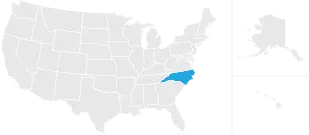
Overview of North Carolina Taxes
North Carolina has a flat income tax rate of 4.25%, meaning all taxpayers pay this rate regardless of their taxable income or filing status. This can make filing state taxes in the state relatively simple, as even if your salary changes, you'll be paying the same rate. No cities in North Carolina have local income taxes.
| Gross Paycheck | $-- | ||
| Taxes | --% | $-- | |
| Details | |||
| Federal Income | --% | $-- | |
| State Income | --% | $-- | |
| Local Income | --% | $-- | |
| FICA and State Insurance Taxes | --% | $-- | |
| Details | |||
| Social Security | --% | $-- | |
| Medicare | --% | $-- | |
| State Disability Insurance Tax | --% | $-- | |
| State Unemployment Insurance Tax | --% | $-- | |
| State Family Leave Insurance Tax | --% | $-- | |
| State Workers Compensation Insurance Tax | --% | $-- | |
| Pre-Tax Deductions | --% | $-- | |
| Details | |||
| Post-Tax Deductions | --% | $-- | |
| Details | |||
| Take Home Salary | --% | $-- | |
North Carolina Paycheck Calculator

North Carolina Paycheck Quick Facts
- North Carolina income tax rate: 4.25%
- Median household income: $73,958 (U.S. Census Bureau)
- Number of cities that have local income taxes: 0
How Your North Carolina Paycheck Works
When you get paid in North Carolina, you will notice that money has been withheld from your wages for FICA, federal and state income taxes. FICA (Federal Insurance Contributions Act) tax is a federal payroll tax paid by both employees and employers. The tax is made up of both Social Security and Medicare taxes. Social Security is taxed at 6.2% of your salary and Medicare at 1.45%. Your employer matches these rates, so the total contribution is doubled. (One thing to keep in mind: If you are self-employed, you are expected to pay the entire amount yourself.)
If your filing status is single, head of household or qualifying widow(er), wages that exceed $200,000 are subject to a 0.9% Medicare surtax. If you're married and file jointly, the extra tax is applied to wages above $250,000. For married couples filing separately, the tax applies to wages above $125,000. Employers do not match Medicare surtax payments.
Besides FICA taxes, you will see federal income taxes are also taken out of your paychecks. This money goes to the IRS, where it is counted toward your annual income taxes. How much someone might pay in federal income taxes varies from person to person, and depends on factors such as your salary, marital status and number of dependents.
When you start a new job in North Carolina or any other state, you have to fill out a new W-4 form. Your employer will then use the information you provide on this form to determine how much to withhold for taxes from your paycheck.
The IRS has made significant changes to the Form W-4 in recent years. For starters, the new form removes the option to claim allowances and it applies a five-step process that lets you indicate any additional income.
Every taxpayer in North Carolina will pay 4.50% of their taxable income in state taxes. North Carolina has not always had a flat income tax rate, though. In 2013, the North Carolina Tax Simplification and Reduction Act radically changed the way the state collected taxes. The act went into full effect in 2014, but before then, North Carolina had a three-bracket progressive income tax system, with rates ranging from 6% to 7.75%. The new law introduced a single flat rate of 5.8% and more than doubled the standard deduction for North Carolina taxpayers. The flat income tax has been decreasing each year, going from 4.99% in 2022 to 4.75% in 2023 to 4.5% in 2024 and 4.25% in 2025.
No cities in North Carolina levy local income taxes.
A financial advisor can help you understand how taxes fit into your overall financial goals. SmartAsset’s free tool matches you with vetted financial advisors who serve your area, and you can have a free introductory call with your advisor matches to decide which one you feel is right for you. If you’re ready to find an advisor who can help you achieve your financial goals, get started now.
How You Can Affect Your North Carolina Paycheck
North Carolina taxpayers who find themselves facing a large IRS bill each tax season should review their W-4 forms, as there's a simple way to use the form to address this issue. Specifically, you can elect to have an extra dollar amount withheld from each of your paychecks to go toward your taxes. While your paychecks will be slightly smaller, you’ll lower the chances of owing money to Uncle Sam during tax season.
You can also save on taxes by putting your money into pre-tax accounts like a 401(k), 403(b) or health savings account (HSA), provided your employer offers these options. Retirement accounts like a 401(k) and 403(b) not only help you save money for your future, but can also help lower how much you owe in taxes. The money that goes into these accounts comes out of your paycheck before taxes are deducted, so you are effectively lowering your taxable income while saving for the future. HSAs work in a similar manner and you can use the money you put in there toward medical-related expenses like copays or certain prescriptions.
Not yet a North Carolina taxpayer, but planning a move to the state soon? Take a look at our North Carolina mortgage guide for important information about rates and getting a mortgage in the state.

